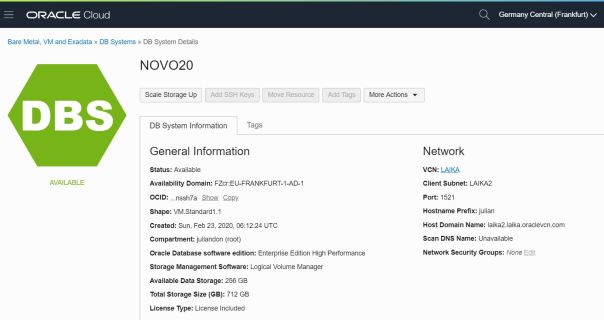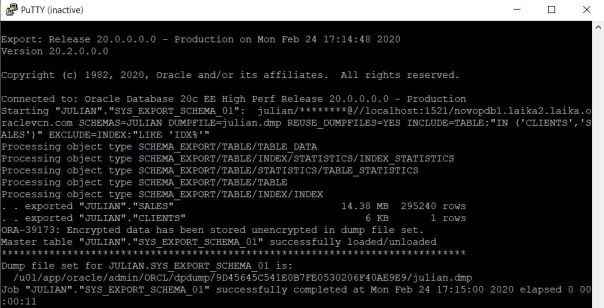Oracle 20c is now available in preview mode from the Oracle Public Cloud. Preview version databases are not intended for production use and have limited functionality.
After testing some of the new features of 20c, here is what might be of interest for most DBAs:
1. Provisioning the database is relatively simple. You need an SSH Public key, create a VCN (Virtual Cloud Network) and a client subnet in your compartment. A hostname prefix is also mandatory. Note that the administrator password must be 9 to 30 characters and contain at least 2 uppercase, 2 lowercase, 2 special, and 2 numeric characters. The special characters must be _, #, or -. You cannot bypass that. The shape type must be “Virtal Machine” and the SMS (Storage Management Software) must be “Logical Volume Manager”.
Once provisioned you need the IP address which is under “Nodes” (bottom left, just under “Resources”). As you can see, it is no longer under “General Information”:
And … you can stop the database only manually (as of today, February 25th, 2020) – there is no button for stopping the node. Just terminate in case you are on a tight budget.
2. Blockchain tables
Blockchain tables are append-only tables in which only insert operations are allowed. Deleting rows is either prohibited or restricted based on time. Rows in a blockchain table are made tamper-resistant by special sequencing & chaining algorithms. Users can verify that rows have not been tampered. Have a look at an example I used to create a blockchain table:
Here is how to manage blockchain tables.
Most important is to specify the Retention Period for the Blockchain Table by using the NO DROP clause in the CREATE BLOCKCHAIN TABLE statement. Also specify the Retention Period for Rows in the Blockchain Table: use the NO DELETE clause in a CREATE BLOCKCHAIN TABLE statement.
3. A multitenant container database is the only supported architecture in Oracle Database 20c. While the documentation is being revised, legacy terminology may persist. In most cases, “database” and “non-CDB” refer to a CDB or PDB, depending on context. In some contexts, such as upgrades, “non-CDB” refers to a non-CDB from a previous release. Check the changes in Oracle 20c for Oracle Multitenant.
4. Data Pump
– Oracle Data Pump 20c can include and exclude objects in the same export or import operation meaning that now, Oracle Data Pump commands can include both INCLUDE and EXCLUDE parameters in the same operation. By enabling greater specificity about what is being migrated, this enhancement makes it easier to migrate to Oracle Cloud, or to another on-premises Oracle Database.
Note: when you include both parameters in a command, Oracle Data Pump processes the INCLUDE parameter first, and includes all objects identified by the parameter. Then it processes the EXCLUDE parameters, eliminating the excluded objects from the included set. Here is an example of including only 2 tables but excluding all indexes except the PKs (real use case: you want to enable Oracle Auto Indexing in ADB and while importing the data you need to drop all indexes except the PKs):
expdp julian SCHEMAS=JULIAN DUMPFILE=julian.dmp REUSE_DUMPFILES=YES INCLUDE=TABLE:\"IN \(\'CLIENTS\',\'SALES\'\)\" EXCLUDE=INDEX:\"LIKE \'IDX\%\'\"
– Oracle Data Pump 20c resumes transportable tablespace export and import jobs that are stopped
– Oracle Data Pump 20c supports parallel export and import operations for Transportable Tablespace (TTS) metadata
– Oracle Data Pump 20c supports optional index compression on imports, including for Oracle Autonomous Database
– Oracle Data Pump 20c supports adding, changing and eliminating table compression
– Oracle Database 20c supports index compression as well by introducing a new TRANSFORM parameter clause, INDEX_COMPRESSION_CLAUSE
– Oracle Data Pump 20c can perform exports from Oracle Autonomous Database into dump files in a cloud object store
– Starting with Oracle Database 20c, a checksum is now added to the dumpfile – you can use the checksum to help to confirm that the file is valid after a transfer to or from the object store and also after saving dumpfiles on on-premises and that it has no
accidental or malicious changes
5. Small improvements and changes in 20c:
– The IGNORECASE parameter for the orapwd file is desupported – all newly created password files are case-sensitive
– A new dynamic view called V$PMEM_FILESTORE displays information about Persistent Memory Filestores
– Certain predefined columns of unified audit records from common unified audit policies can be written to the UNIX SYSLOG destination – to enable this feature, you set UNIFIED_AUDIT_COMMON_SYSTEMLOG, a new CDB level init.ora parameter (added in Oracle 19c (19.3) but not included in the References)
– You now can set the TABLESPACE_ENCRYPTION_DEFAULT_ALGORITHM dynamic parameter to define the default encryption algorithm for tablespace creation operations
– Database Vault: a DV_OWNER common user in the CDB root can prevent local users from creating Oracle Database Vault controls on common objects in a PDB
– AutoShrink: Oracle Automatic Storage Management Cluster File System (Oracle ACFS) automatic shrinking automatically shrinks an Oracle ACFS file system based on policy, providing there is enough free storage in the volume
– The Oracle Grid Infrastructure feature Automatic Storage Management Cluster File System (Oracle ACFS) is desupported with Microsoft Windows
– An Oracle Database installation configures all Oracle Database homes in read-only mode by default
– Traditional auditing is deprecated in Oracle Database 20c thus Oracle recommend that we use unified auditing, which enables selective and more effective auditing inside Oracle Database
– The package DBMS_OBFUSCATION_TOOLKIT is desupported, and replaced with DBMS_CRYPTO
– Older encryption and hashing algorithms contained within DBMS_CRYPTO are deprecated
– The Large Object (LOB) features DBMS_LOB.LOADFROMFILE and LOB buffering are desupported
– You can configure database clients to maintain multiple Secure Sockets Layer (SSL) sessions using different SSL certificates
– In the DBMS_ROLLING.set_parameter(), there is a new parameter, called BLOCK_UNSUPPORTED – by default, BLOCK_UNSUPPORTED
is set to 1 [YES], indicating that operations performed on tables that are unsupported by Transient Logical Standby will be blocked on the primary database. If set to 0 [OFF], then the DBMS_ROLLING package does not block operations on unsupported tables
– In order to coordinate with the Oracle GoldenGate feature OGG EXTRACT, the LOGICAL_REPLICATION clause now provides support for automatic extract of tables
– Two new views, DBA_OGG_AUTO_CAPTURED_TABLES, and USER_OGG_AUTO_CAPTURED_TABLES, provide you with tools to query which tables are enabled for Oracle GoldenGate automatic capture
6. Finally, her are the 7 new init.ora parameters in Oracle 20.2.0:
DBNEST_ENABLE (DbNest is OS resource and file system isolation for PDBs)
DBNEST_PDB_FS_CONF
DIAGNOSTICS_CONTROL (meant to be used with Oracle Support)
MAX_IDLE_BLOCKER_TIME (maximum number of minutes before a blocking session is automatically terminated)
PMEM_FILESTORE
TABLESPACE_ENCRYPTION_DEFAULT_ALGORITHM
OPTIMIZER_REAL_TIME_STATISTICS



